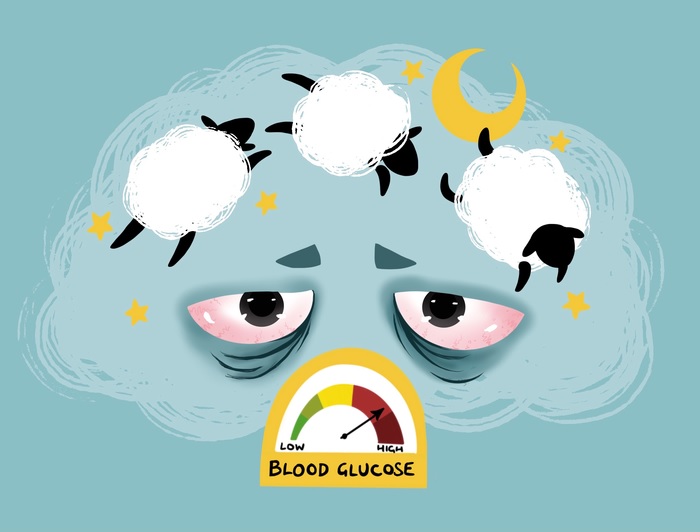
Image credits: Martin Rutter, University of Manchester
Experimental studies have shown that reducing sleep duration or disrupting sleep results in increased insulin resistance and higher plasma glucose levels. Systematic reviews and meta-analyses of prospective studies have consistently found that shorter and longer sleep durations are associated with increased risk of type 2 diabetes (T2D).
Observational studies have also shown that insomnia, daytime napping, and chronotype (night preference) are associated with an increased risk of T2D. However, causal relationships are unclear from these data due to potential biases from residual confounding (e.g., from physical activity and diet) and reverse causality (e.g., from nocturia and neuropathic pain).
Understanding the impact of sleep traits on glycemic levels in the general population could have profound public health implications for diabetes prevention.
Aim
Our objective was to explore the effects of sleep traits (e.g., insomnia), sleep duration, daytime sleepiness, daytime napping, and chronotype on average glycemic levels as assessed by glycated hemoglobin (HbA1c) (main outcome) and glucose. (secondary outcome) in the general population.
Methodology
This study triangulated the evidence through multivariable regression (MVR) and one-sample (1SMR) and two-sample (2SMR) Mendelian randomization, including sensitivity analyzes on the effects of five self-reported sleep traits (i.e., sleep symptoms). insomnia [difficulty initiating or maintaining sleep], sleep duration, daytime sleepiness, naps and chronotype) in HbA1c (in SD units) in adults of European ancestry from the UK Biobank (for MVR and 1SMR analysis) (n = 336 999; mean [SD] age 57 [8] years; 54% female) and in the Glucose and Insulin Related Traits Consortium (MAGIC) genome-wide association studies (for 2SMR analysis) (n = 46 368; 53 [11] years; 52% women).
Results
In multivariable regression (MVR), 1SMR, 2SMR, and their sensitivity analyses, we found that a higher frequency of insomnia symptoms (usually vs. sometimes or rarely/never ) was associated with higher HbA1c (MVR 0 .05 SD units [95% CI 0.04–0.06]; 1SMR 0.52 [0.42-0.63]; 2SMR 0.24 [0.11-0.36]).
The associations remained, but the point estimates were somewhat attenuated after excluding participants with diabetes. For other sleep traits, there was less consistency between methods, and some, but not all, provided evidence of an effect.
Conclusions Our results suggest that frequent insomnia symptoms cause higher HbA1c levels and, by implication, that insomnia has a causal role in type 2 diabetes . These findings could have important implications for developing and evaluating strategies that improve sleep habits to reduce hyperglycemia and prevent diabetes. |
















